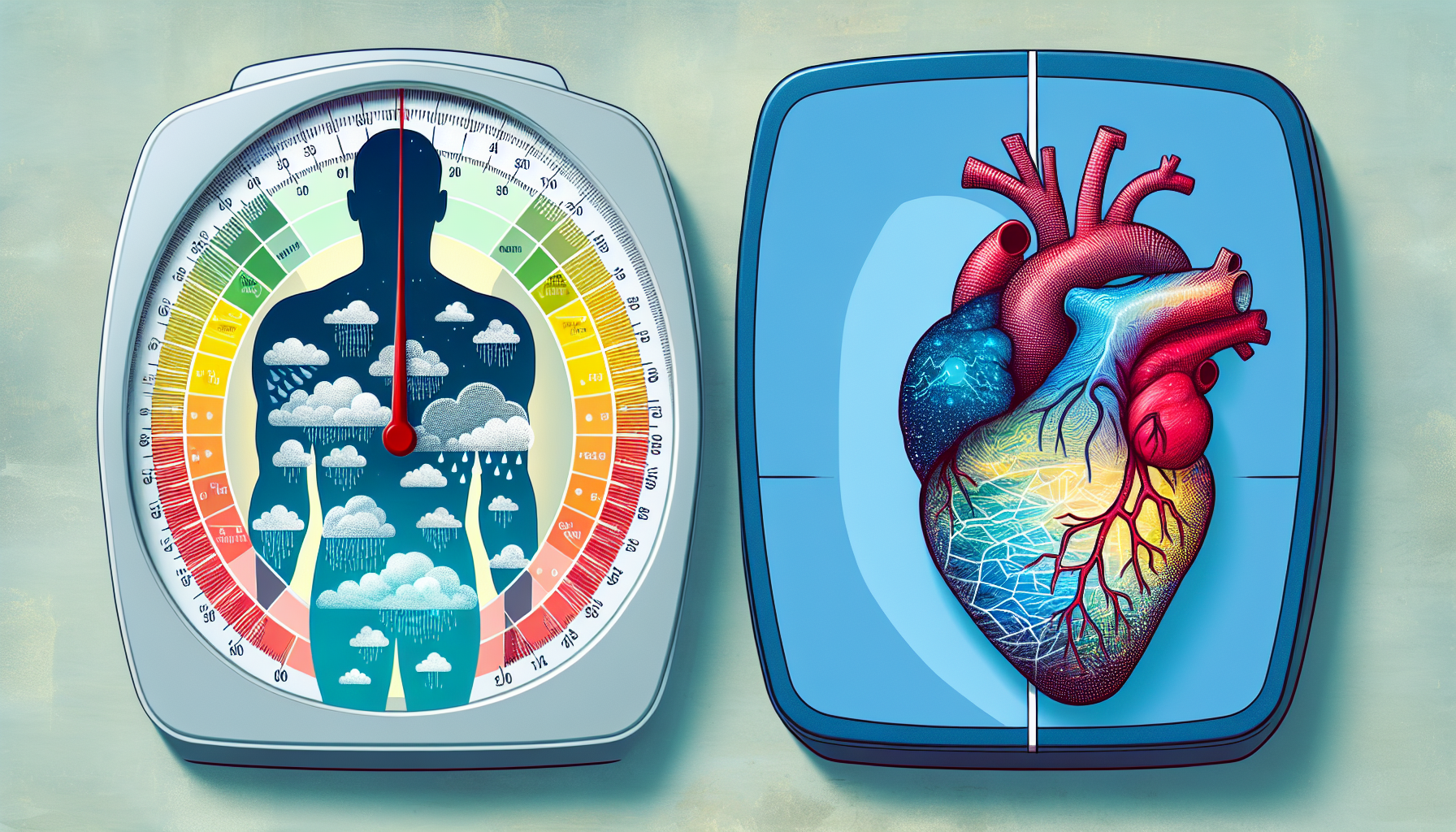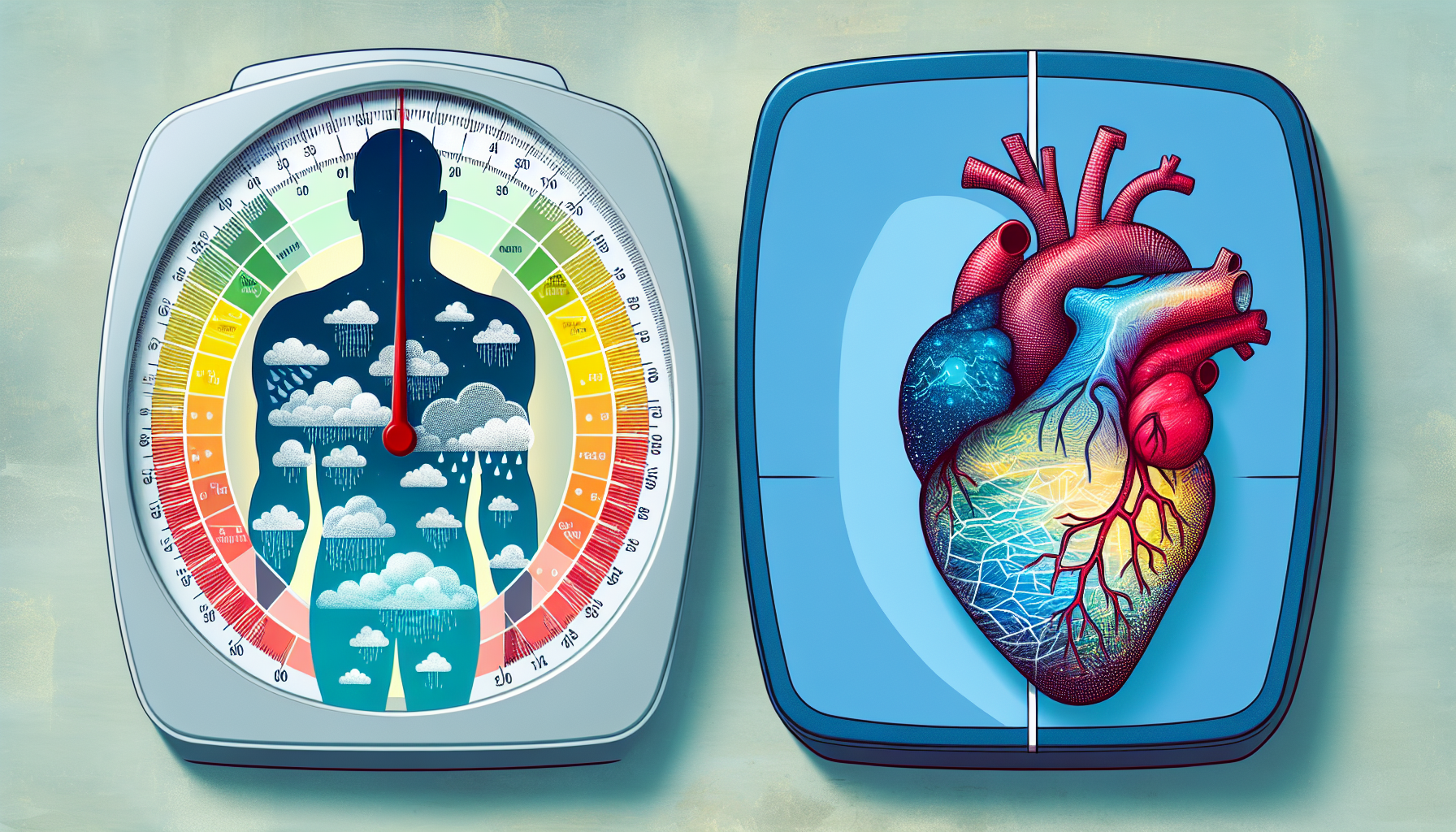
Imagine this scenario: you find yourself in a state of unhappiness, perhaps due to the stress of everyday life or personal struggles. Alongside this emotional turmoil, another concern arises in your mind: can you actually lose weight while feeling down? It’s a question that many have pondered, and in this article, we will explore the intriguing relationship between weight loss and emotional wellbeing. So, let’s embark on this journey together to discover if shedding those extra pounds is possible even when happiness is in short supply.
The Relationship between Happiness and Weight Loss
Losing weight can be a challenging and complex journey, and it is essential to consider the role that happiness plays in this process. The link between happiness and weight loss is multifaceted and goes beyond the surface level. Understanding this relationship can guide individuals towards a more holistic approach to their weight loss goals, addressing both physical and emotional well-being.
Understanding the Link
Happiness and weight loss are interconnected in various ways. When you are happy, you are more likely to adopt healthy habits, such as exercising regularly and making mindful food choices. On the other hand, unhappiness can lead to emotional eating, a negative self-perception, and increased stress levels, all of which can hinder weight loss efforts.
Exploring the Impact of Unhappiness on Weight Loss
Unhappiness can have a significant impact on weight loss outcomes. Negative emotions can trigger a vicious cycle where individuals turn to food for comfort or as a coping mechanism, leading to weight gain. Emotional stress and dissatisfaction contribute to a heightened release of cortisol, a stress hormone that can promote fat storage and hinder metabolism. Thus, it becomes crucial to address unhappiness to enhance weight loss success.
Factors Affecting Weight Loss in Unhappy Individuals
Various psychological and behavioral factors contribute to the impact of unhappiness on weight loss. Emotional eating, negative self-perception, lack of motivation, and unhealthy coping mechanisms are some of the hurdles that unhappy individuals may encounter on their weight loss journey. Understanding and addressing these factors is key to achieving sustainable and long-term weight loss goals.
Psychological Factors and Weight Loss
Emotional Eating and Unhappiness
Emotional eating is one of the most common challenges faced by individuals who are unhappy. When we experience negative emotions, such as stress, sadness, or loneliness, we may find solace in food. Emotional eating often involves consuming comfort foods that are high in calories and low in nutritional value. This unhealthy relationship with food can sabotage weight loss efforts and perpetuate the cycle of unhappiness.
Negative Self-perception and Weight Loss
Unhappiness often stems from a negative self-perception, which can manifest as low self-esteem and a poor body image. When individuals view themselves negatively, they may struggle to believe in their ability to achieve their weight loss goals. This lack of self-confidence can lead to self-sabotage, making it challenging to make sustainable changes and maintain a healthy lifestyle. Addressing and improving self-esteem is crucial for successful weight loss.
The Role of Stress in Weight Loss
Stress can have a profound impact on weight loss, particularly in unhappy individuals. Chronic stress triggers the release of cortisol, which can promote fat storage, especially around the abdominal area. Additionally, stress often leads to emotional eating and unhealthy coping mechanisms, such as excessive alcohol consumption or lack of physical activity. Managing stress effectively is essential for weight loss success.

Behavioral Factors and Weight Loss
Lack of Motivation and Weight Loss
Unhappiness can drain your motivation, making it challenging to stick to a weight loss plan. When you are unhappy, finding the drive and determination to make positive changes can be difficult. Lack of motivation often results in inconsistency and a reluctance to engage in healthy behaviors, hindering progress. Overcoming this barrier requires finding strategies to boost motivation, such as setting realistic goals and seeking social support.
Unhealthy Coping Mechanisms and Weight Gain
Unhappiness can lead to the development of unhealthy coping mechanisms, such as binge eating, excessive alcohol consumption, or drug use. These behaviors offer temporary relief from negative emotions but can have detrimental effects on weight loss efforts. Breaking free from these destructive patterns is crucial for successful weight loss and overall well-being.
Mindless Eating and Weight Loss
Unhappiness can also contribute to mindless eating, where individuals consume food without truly paying attention to hunger cues or nutrition. Mindless eating often involves overeating or indulging in unhealthy snacks, leading to weight gain. Developing mindful eating habits, such as eating slowly, savoring each bite, and being aware of hunger and fullness cues, can help address this issue and support weight loss goals.
Addressing Unhappiness for Successful Weight Loss
Addressing Emotional Triggers
To achieve successful weight loss, it is vital to address the emotional triggers that contribute to unhappiness. This involves identifying the root causes of negative emotions, such as unresolved trauma, relationship issues, or work-related stress. Seeking therapy or counseling can provide the necessary support to navigate these emotional triggers and develop healthier coping mechanisms.
Improving Self-esteem and Body Image
Improving self-esteem and body image is crucial for long-term weight loss success. Engaging in activities that promote self-acceptance, such as positive affirmations, self-care practices, and surrounding yourself with supportive individuals, can help boost self-esteem. Building a positive body image involves challenging societal beauty standards and focusing on overall health and well-being rather than solely on physical appearance.
Managing Stress for Weight Loss Success
Managing stress is essential for weight loss success and overall happiness. Implementing stress management techniques, such as regular exercise, mindfulness practices, journaling, or engaging in hobbies, can help reduce stress levels. Additionally, learning effective stress management skills through therapy or counseling can provide valuable tools to navigate challenging situations and prevent stress-induced weight gain.

The Importance of Professional Guidance
The Role of Therapists and Counselors
Seeking professional guidance from therapists and counselors can significantly impact both the weight loss journey and overall happiness. These mental health professionals can provide a safe space to explore and address the emotional factors that contribute to unhappiness. Through therapy or counseling sessions, individuals can gain insight, develop coping mechanisms, and build resilience, ultimately supporting their weight loss efforts.
Working with Nutritionists and Dietitians
Nutrition plays a pivotal role in weight loss, and working with nutritionists or dietitians can be invaluable. These professionals can provide personalized guidance, helping individuals develop a balanced and sustainable eating plan. Additionally, they can educate on mindful eating, portion control, and the importance of proper nutrition for overall well-being. Collaborating with nutrition experts ensures that weight loss is approached in a healthy and informed manner.
Support Groups for Emotional Support and Weight Loss
Joining support groups offers a sense of community and emotional support, both of which are crucial for weight loss success. Support groups can provide a safe space to share experiences, gain perspective, and receive encouragement from individuals who are on a similar journey. These groups often focus on addressing both the emotional and behavioral aspects of weight loss, providing valuable insights and strategies for success.
Simple Strategies to Enhance Happiness and Facilitate Weight Loss
Incorporating Exercise for Improved Mood
Exercise has numerous benefits for both physical and mental health. Engaging in regular physical activity releases endorphins, also known as “feel-good” hormones, which can enhance mood and reduce feelings of unhappiness. Finding an exercise routine that brings you joy, whether it’s dancing, hiking, or practicing yoga, can significantly contribute to both weight loss and overall happiness.
Prioritizing Self-care and Mental Well-being
Prioritizing self-care is essential for restoring happiness and supporting weight loss efforts. Taking time to engage in activities that bring you joy, such as reading, taking baths, spending time in nature, or pursuing hobbies, can replenish your emotional well-being. Focusing on mental well-being, such as getting quality sleep, practicing relaxation techniques, and engaging in positive self-talk, can also contribute to overall happiness and create a fertile ground for weight loss success.
Practicing Mindfulness and Gratitude
Mindfulness and gratitude practices can cultivate a positive mindset and enhance happiness. Mindfulness involves being fully present in the moment, allowing you to observe thoughts and feelings without judgment. Incorporating mindfulness exercises, such as meditation or deep breathing, can help manage negative emotions and reduce emotional eating. Similarly, expressing gratitude for the positive aspects of life, whether through journaling or verbal affirmations, can foster a sense of happiness and contentment.
The Benefits of Social Support in Weight Loss Journey
Engaging in Social Activities
Social interactions and engaging in activities with others can significantly impact happiness and weight loss. Participating in social activities not only provides a sense of belonging but also distracts from negative emotions that may trigger overeating. Friendships and group activities can be a source of support, motivation, and accountability, making the weight loss journey more enjoyable and successful.
Building a Supportive Network
Surrounding yourself with a supportive network of family, friends, or fellow weight loss enthusiasts can provide the encouragement and understanding needed for long-term success. Sharing your goals, struggles, and achievements with trusted individuals can help alleviate feelings of unhappiness and create a pro-active support system. This network can offer valuable advice, cheer you on during challenging times, and celebrate your weight loss milestones.
Joining Weight Loss Programs
Joining weight loss programs or communities can offer a structured approach to weight loss while providing a supportive environment. These programs often combine nutrition education, exercise guidance, and emotional support, addressing the various factors that contribute to weight loss success. The camaraderie and accountability within a weight loss program can foster a sense of happiness and help individuals overcome hurdles on their journey.
Recognizing the Need for Professional Help
When to Seek Therapy
Recognizing when professional help is needed is essential for both mental well-being and weight loss success. If unhappiness persists despite efforts to address it, if it significantly interferes with daily life, or if it leads to harmful behaviors, seeking therapy is recommended. A therapist can guide individuals in exploring underlying issues, developing coping mechanisms, and creating a personalized plan to address unhappiness and support weight loss goals.
Finding the Right Mental Health Professional
Finding the right mental health professional is crucial for effective therapy. It is essential to research and choose a therapist or counselor who specializes in the areas that align with your specific needs, such as emotional eating, body image issues, or stress management. Engaging in an open and trusting therapeutic relationship is key to receiving the guidance and support necessary for both happiness and weight loss success.
Combining Therapy and Weight Loss Efforts
Combining therapy or counseling with weight loss efforts can result in a comprehensive approach to overall well-being. Addressing the emotional and psychological factors that contribute to unhappiness can help individuals develop healthier coping strategies, improve self-esteem, and enhance motivation for weight loss. Therapy sessions can provide valuable insights and tools that empower individuals to overcome obstacles and achieve sustainable weight loss.
Overcoming Challenges and Barriers
Dealing with Setbacks and Plateaus
Setbacks and plateaus are common on any weight loss journey, and they can evoke feelings of unhappiness and frustration. It is essential to approach these challenges with resilience and a growth mindset. Embracing setbacks as learning opportunities and experimenting with new strategies can help overcome plateaus and maintain motivation. Seeking support from professionals or support groups can provide guidance and encouragement during these challenging times.
Breaking the Cycle of Emotional Eating
Breaking free from the cycle of emotional eating requires awareness and alternative coping mechanisms. Recognizing the triggers for emotional eating, such as stress or boredom, and finding healthier ways to manage these emotions, such as engaging in physical activity or seeking emotional support, can help break the cycle. Developing a toolbox of positive coping strategies is crucial for long-term weight loss success and emotional well-being.
Building Healthy Habits for Sustainable Weight Loss
To achieve sustainable weight loss and happiness, it is necessary to build healthy habits that align with your individual needs and preferences. This includes implementing a balanced and nutritious eating plan, engaging in regular exercise, optimizing sleep, and managing stress effectively. Creating a routine that incorporates these habits gradually and consistently can lead to long-term success and a greater sense of overall well-being.
Maintaining Long-term Weight Loss and Happiness
Setting Realistic Goals and Expectations
Setting realistic goals and expectations is vital for maintaining long-term weight loss and happiness. It is essential to acknowledge that weight loss is not linear and that individual progress may vary. Celebrating each milestone, no matter how small, and focusing on progress rather than perfection can foster a positive mindset and prevent feelings of unhappiness or disappointment.
Celebrating Non-scale Victories
While weight loss is often associated with numbers on a scale, it is crucial to celebrate non-scale victories as well. Non-scale victories can include improved energy levels, increased self-confidence, clothes fitting better, or improved overall health markers. Recognizing and celebrating these achievements can enhance happiness and motivate individuals to continue their weight loss journey.
Creating an Overall Healthy and Balanced Lifestyle
Maintaining weight loss and happiness requires the adoption of an overall healthy and balanced lifestyle. This includes consistently engaging in physical activity, maintaining a nutritious eating plan, managing stress effectively, prioritizing sleep, and practicing self-care. By creating a lifestyle that nourishes both the body and mind, individuals can sustain their weight loss achievements while nurturing their overall well-being.
In conclusion, the relationship between happiness and weight loss is undeniable. Unhappiness can negatively impact weight loss efforts, while weight loss can contribute to increased happiness. Addressing the psychological and behavioral factors associated with unhappiness is crucial for achieving sustainable weight loss. Seeking professional guidance, incorporating positive strategies, and building a support network can further enhance weight loss and overall well-being. By prioritizing happiness and adopting a holistic approach to weight loss, individuals can achieve their goals and create a fulfilling and balanced life.













Leave a Reply